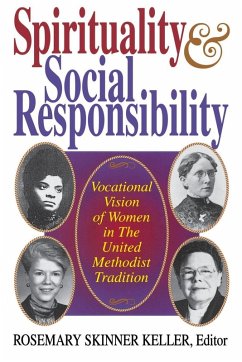
Weary Throats and New Songs
Versandkostenfrei!
Versandfertig in 1-2 Wochen
23,99 €
inkl. MwSt.

PAYBACK Punkte
12 °P sammeln!
Outline of Chapters: 1) Reviews the history of black women proclaiming God's word since the 1800s. 2) Investigates alternative pulpits/places and hence, forms of proclamation. 3) How do women prepare to preach? Text selection, translations, avoidance of certain texts, and so forth. 4) How is the sermon shaped? Reviews sermon form, organization, illustrations, imagery, theology, movement, phrasing, cliches, social impact, cultural relevance, and use of songs, poetry, and testimony. 5) How do sermons communicate? Compares manuscript delivery to extemporaneous delivery, orality, audibility, language use, pitch, voice, ending, emotive content, improvisation, sermon length, and so forth. 6) How do women present themselves while preaching? Evaluates appearance, posture, carriage, attire, and affect. 7) What does the future of balck women preaching look like? Some projections and conclusions.
Examines the rich heritage of African American women who have proclaimed--and still proclaim--God's word. Against all odds, African American women have passionately proclaimed the goodness of God and lifted up Jesus' name despite barriers of race, class, denomination, education and gender. In response to a sense of deliverance from evil and in gratitude for answered prayers, these women have related their faith and trust in God in sacred places such as ships, fields, homes, barns, factories, hospitals, schools, pulpits, missionary societies, and over kitchen sinks. Even when disenfranchised in the religious communities they helped create, African American women continue to "say a word" about God, whether they are ordained or not. This book provides a brief review of the rich heritage of African American female proclaimers and examines contemporary African American women's sermon preparation, content, delivery, and personhood. Brown draws heavily on interviews and conversations, as well as audio and video tapes of women proclaiming God's word, to relate how and why African American women tell others about God despite resistance (weary throats) and with the help of support (new songs) in religious and social communities.














